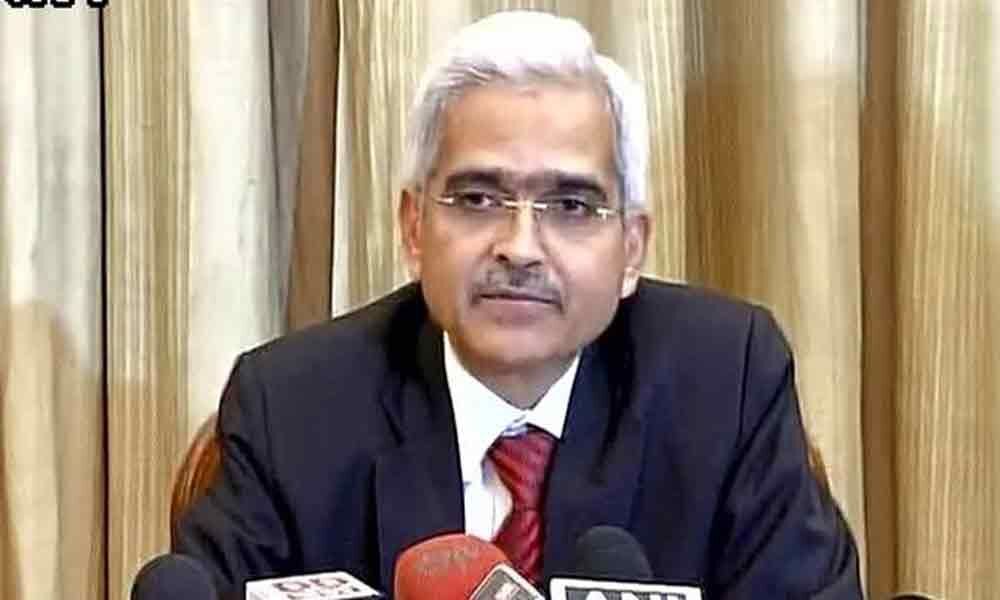Live
- BJP leader Krishna Sagar Rao condoles death of former PM Manmohan Singh
- Sirivella: Engg student dies in accident
- Revanth deeply condoles Manmohan Singh’s death
- With eye on local body polls, TPCC gears up to rejig body
- Never share OTPs with strangers: DIG Koya Praveen
- Amid Mizzle, Citizens lap up chilly weather
- 5-day FDP held at KSRM Engg College
- Traffic cops debunk claims of discounts on e-Challans
- Elaborate security arrangements made for Vaikunta Ekadasi: SP Subba Rayudu
- Cong flays TTD move to remove non-Hindu staff
Just In
RBI to discuss issuance of sovereign bonds with govt: Governor Shaktikanta Das


The Reserve Bank of India (RBI) issues bonds on behalf of the government as part of the resource mobilisation exercise to bridge gap between revenue and expenditure
New Delhi: RBI Governor Shaktikanta Das on Monday said the central bank will discuss with the government the issuance of overseas sovereign bonds, an instrument that will help reduce dependence on the domestic market for bridging fiscal deficit.
The Reserve Bank of India (RBI) issues bonds on behalf of the government as part of the resource mobilisation exercise to fund gap between revenue and expenditure.
Expressing his satisfaction over the government's move to slash fiscal deficit target, Das said it will help improve investment by the private sector as crowding out impact will be less.
After the customary post-budget meeting with Finance Minister Nirmala Sitharaman, he said, "The government has made a budget announcement and we will interact with the government.
I am sure the government will have a discussion with the RBI. Whatever we need to discuss with the government, will be discussed internally."
Finance Minister Nirmala Sitharaman in Budget 2019-20 announced that the government will start raising a part of its gross borrowing programme from external markets in foreign currencies. She added that the country's sovereign external debt-to-GDP ratio level is among the lowest globally at less than 5 per cent.
It is not often that the government taps the foreign markets to raise funds. On the fiscal deficit, Das said the RBI will always be happy if it is maintained.
"In this case, fiscal deficit has been improved actually from 3.4 to 3.3 per cent of the GDP.
The RBI will be happy mainly because it limits so-called crowding out effect. So, that's something positive because it gives more space for meeting the private sector borrowing," he said.
Overall, there is fiscal glide path which the government is maintaining in the last five years, he said adding that the government started with a fiscal deficit number of 4.5 per cent.
"Now, it has gone down to 3.3. There is a glide path which is being maintained. I think, overall, it will be good for microeconomic situation," he added.
The Centre has committed to reduce the fiscal deficit, the gap between total expenditure and revenue, to 3 per cent of the gross domestic product (GDP) by 2020-21 and eliminate the primary deficit as per the Fiscal Responsibility and Budget Management (FRBM) Act.
Primary deficit refers to the deficit left after subtracting interest payments from the fiscal deficit.
With regard to additional responsibility given to the central bank for regulating housing finance companies (HFCs), he said it has been given after a lot of deliberation within the government and also with the RBI.
"The RBI will do its best to live up to expectations of the additional responsibility which has been given to the RBI and I am quite confident that we will be able to deal with this additional responsibility affectively," he said.

© 2024 Hyderabad Media House Limited/The Hans India. All rights reserved. Powered by hocalwire.com






